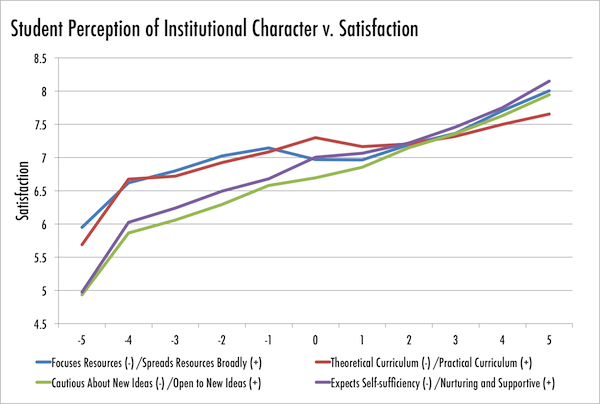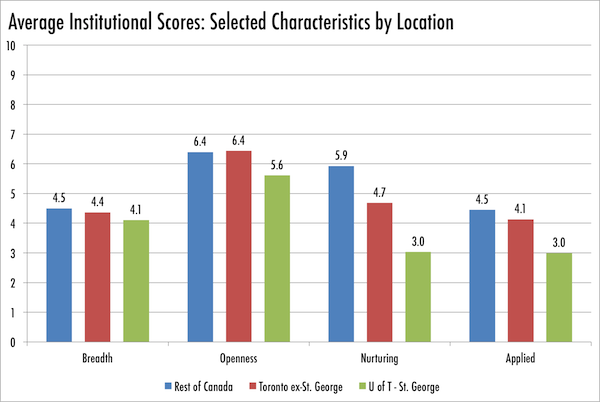To date, we’ve been musing about the causes of Toronto students’ dissatisfaction. But let’s put the shoe on the other foot for a bit: what causes student satisfaction to begin with?
One thing we ask in the Globe Canadian University Report survey is students’ perceptions about a number of dimensions of the character of their institution. For instance, we ask them if they think their institution’s curriculum is more theoretical or applied, whether the institution is broadly-based or focuses on a few areas of study, etc. (to save space, we’ll spare you the methodology and wording caveats; contact us directly if you want to know more).
It turns out that students’ perceptions of certain dimensions of institutional character are remarkably closely correlated with satisfaction:
Here’s what Figure 1 tells us: Students are more satisfied if they think their institution isn’t specializing in certain areas, but rather is spreading the (monetary) love about evenly across different fields of study. If they think their curriculum is practical/applied, they’re happier than if they think it’s theoretical. Students who see their schools as expecting them to be self-sufficient or as cautious to new approaches and ideas are miserable; by contrast, those who see their institution as “nurturing and supportive” or “open to new approaches” are extremely satisfied. Indeed, the range of satisfaction from one end of the scale to the other for both of these measures is over three points: that’s larger than the entire range of institutional satisfaction results in the 2012 Canadian University Report.
So, might these factors explain our Toronto problem? Are Toronto institutions seen as too theoretical, closed to new approaches, etc?
It turns out that Toronto institutions aren’t rated differently from institutions elsewhere in terms of spreading their wealth and are barely different in terms of being open to new ideas. Having a theoretical curricula is a big factor for St. George, but not for the rest of Toronto on average (though there is variation – applied curricula at Ryerson and OCAD offset theory at York and the U of T satellites). Only on the issue of being insufficiently nurturing/supportive of students – a measure inversely correlated with institutional size – is there a clear difference between Toronto schools and those elsewhere. But even this is less than it seems. Toronto’s numbers are being driven by the three U of T campuses and OCAD (all of which do badly even once size is taken into account); York’s score is about average while Ryerson does exceptionally well on this measure.
In short, institutional characteristics are an important driver of satisfaction generally, but can only partially explain our Toronto conundrum.
The search continues next week. Stay tuned.
— Alex Usher and Jason Rogers



 Tweet this post
Tweet this post

These have been interesting posts. But like a lot of PSE research there is far more variance within than between. Have you looked within the Toronto-area schools to see which programs/populations are scoring these items higher and lower?
But more importantly a note to be careful with the word “causes.” and “explains” I am pretty sure you mean related to. These data are not causing anything.